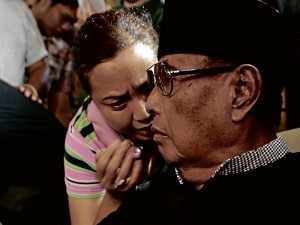MANILA, Philippines — Sabah remains elusive to the Sultanate of Sulu a year after the daring revival of its claim to the resource rich land that Malaysia calls its own.
Even so, Princess Jacel Kiram-Hasan believes that it was a victorious campaign.
“That doesn’t mean defeat. To me, we still won because of what happened, there was awareness now among the people. It used to be fight of the sultanate, actually even just of the Kirams. But now, it has become the fight of the Filipinos,” Hasan told the Philippine Daily Inquirer on Saturday morning.
The daughter of the late Sulu Sultan Jamalul Kiram III, Hasan talked about the stand-off as if it had happened just a few weeks ago.
Exactly a year ago on Monday (Feb. 10), the sultanate’s followers led by Kiram’s brother, Rajah Muda Agbimuddin Kiram, arrived at the coastal town of Lahad Datu in the Felda Sahabat district.
It turned into a three-month bloody standoff and strained relations between the Philippines and Malaysia.
The pain in Hasan’s voice brought about by the apparent disdain by the Philippine government over the incursion of the sultanate’s followers into the coastal town of Lahad Datu on Sabah remained palpable.
“They just don’t want to deal with the issue. And to think we are so gung-ho when it comes to China. To think the Sabah claim has a historical basis, we won’t pursue it?” Hasan said in Filipino, mentioning the country’s other territorial dispute.
She frowned at the mention of the Aquino administration’s unreleased “study” on the Sabah claim.
“We can’t expect anything from the political leadership today. We’ll just wait for the right leader to help us with our advocacy,” Hasan, 36, said.
It was frustrating to Hasan that many in government appeared to have a lack of appreciation of their own country’s history.
For example, Hasan agreed with the observation that if the leaders in Manila understood the culture of the Tausugs, not one of them would have mentioned the word “surrender” to this fighting tribe.
“You have to know your people. We are a nation with a diverse culture,” Hasan stressed.
After a series of unfortunate events befell the country in 2013, the sultanate’s claim to Sabah was once again swept under the rug, at least by the political leaders.
But Hasan said the people’s awareness has remained high. Since the standoff and she became her father’s spokesperson throughout the three-month saga, Hasan continues to be invited to speaking engagements left and right.
In fact, she has been invited to be the commencement speaker at the high school graduation of her alma mater, the Philippine Normal University in Manila, this March.
“And I was not even our class valedictorian!” she giggled.
Hasan’s invites are mostly from the academe throughout the country. Her audience are often high school and college students whom she observed showed keen interest in their country’s history.
Hasan said most young people were in awe whenever she explained that the Philippines’ history dated back to the sultanates, way before 1521 when Ferdinand Magellan arrived.
“Imagine, many of us believe that our history only began in 1521?” Hasan remarked.
Hasan added that since the standoff, she noticed that barriers between Muslims and Christians seemed to have been transcended and the Sabah claim even gave each one a sense of pride.
“The issue unified us. There are no Christians or Muslims. Just Filipinos,” she said.
Many also appear to have embraced the fact that royalty does exist in the Philippines, even if it were a small one without any political power.
Hasan is called “Princess” these days and it’s not because it is her birth name. Mostly, it is a sign of respect and recognition of her royal lineage.
It has been a while since Hasan was able to speak to her uncle, Agbimuddin, who remains somewhere in Sabah with his men. But the Raja Muda did speak to her father before the sultan passed away in October last year, Hasan said.
The guerrilla camp established by the RSF in April last year is still there and the sultanate’s followers are living quiet lives, according to Hassan.
On March 1, the sultanate will commemorate the first anniversary of what it calls the massacre of its RSF fighters in Sabah. They will hold a “Duwaa,” a prayer for the souls of the 10 RSF martyrs who died in a bloody clash with the Malaysian security forces that day.
Last year too, Hasan said she was surprised that a group of RSF fighters who were able to sneak back to Jolo from Sabah asked to meet her. They gave an assurance that they would continue the fight to reclaim Sabah, Hasan said.
The sultanate is now under the leadership of Hasan’s uncle, Sultan Esmail Kiram.
Hasan, who was arguably an effective and strong spokesperson who made people understand what the claim and the sultanate were all about, has yet to be given an official task by the new sultan in terms of the sultanate’s pursuit of Sabah.
But apparently, she does not need to be told what to do.
With pride, Hasan said she was brought up by her parents to fight for what is right. And she vows to do just that when it comes to Sabah.
RELATED STORIES
Abuse of Filipino ‘illegals’ in Sabah probed
Aquino scrimps on words over Sabah claim


